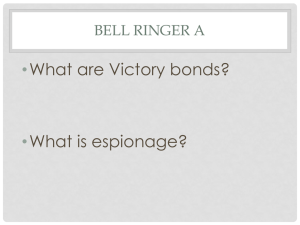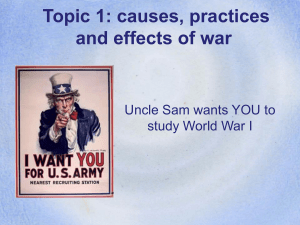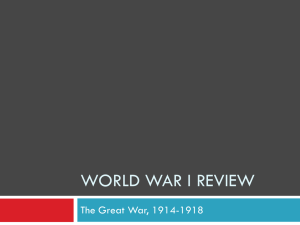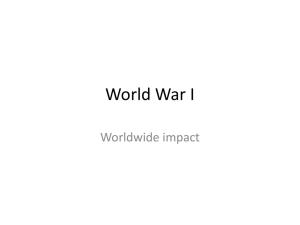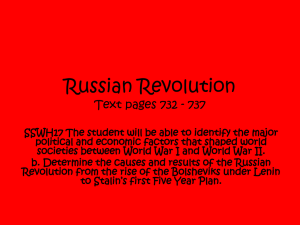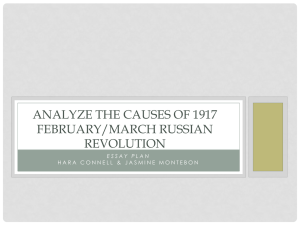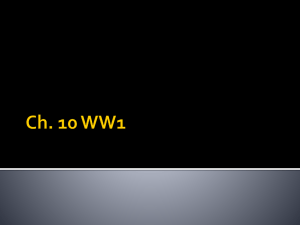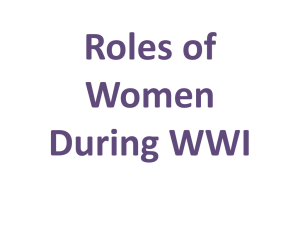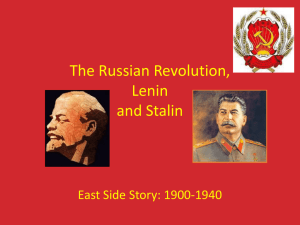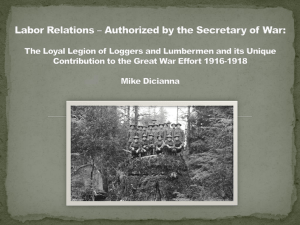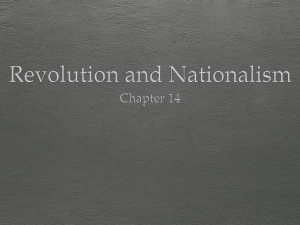World War I and the Russian Revolution: 1914-1920
advertisement
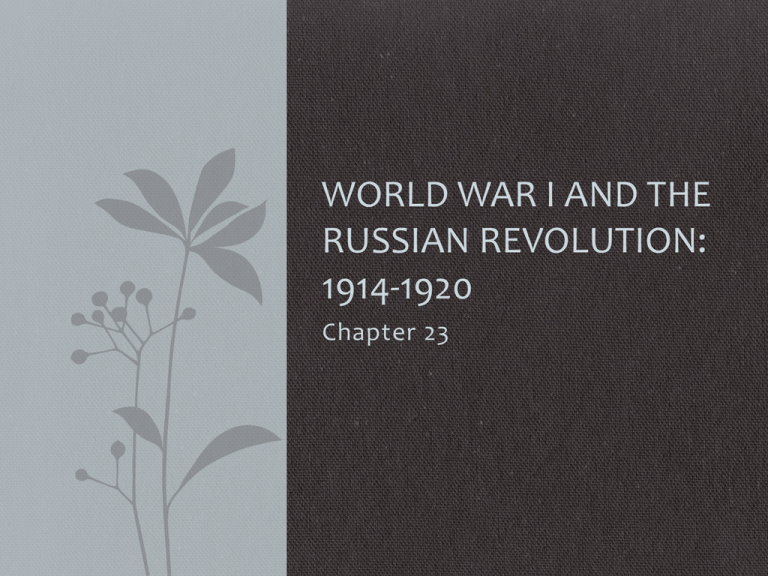
WORLD WAR I AND THE RUSSIAN REVOLUTION: 1914-1920 Chapter 23 Big Questions to Think About • Did the reasons for going to war in 1914 turn out to be worth it? In other words if everyone in Europe could do it over again would they still choose to go to war in 1914? • Why did some empires (Russian, German, Austro-Hungarian, Ottoman) collapse while other empires (British, French, Italian) didn’t? • What are the consequences of a total war for society? • Are wars beneficial to human civilization? Are there ever any good consequences of a war? If so how do we handle this paradox? • What made WWI different from earlier wars? World War I: How was it Unique? Reason #1: Industrial Revolution • New warfare technologies • • • • • • • • • Battleship Machine gun Repeating rifle Airplane Submarine Poison gas/chemical warfare Tanks Railroads Automobile • Production on a massive scale previously unknown in world history Industrial Revolution Reason #2: Imperialism • When European countries go to war what happens to their colonies, imperial territories? • Example: In 1914 when Britain goes to war so does • Canada, Australia, New Zealand, India, South Africa, Egypt, Kenya, Nigeria, the Bahamas, etc. • Natural Resources from around the world used to fight WWI • People from around the world fought in WWI Indian Soldiers Fighting in Europe During WWI Countries Involved in WWI Reason #3: New Ideas • Nationalism: harnessing the power of the people • People were devoted to their nations and countries, would do crazy things for national pride (like die) • Non-soldiers were willing to make immense sacrifices for the nation as well • Socialism: harnessing the power of the economy • Government control of the economy • Entire economy could be planned out in order to maximize efficiency, make as much stuff as possible • Total War • When the all the human and economic resources of a country are totally devoted to fighting a war—happened during WWI • Communism • Many communists saw WWI as the beginning of the world wide communist revolution that Marx had predicted Marching of to War in 1914 (With a Smile!) Waiting in Line to Volunteer for WWI WWI: The Basics • When: 1914 to 1918 (cease fire) • Where: mostly in Europe, but battles around the world—Middle East, Africa, East Asia, Atlantic Ocean • Who: Allied Powers vs Central Powers • Why: It’s complicated Allied Powers vs. Central Powers Allied Powers (Entente Powers) Central Powers Britain Germany France Austria-Hungary Russia Ottoman Empire (Turkey) Italy (after 1915) Bulgaria United States (after 1917) Japan Romania Serbia Belgium Greece Portugal Lots of Others (starting to figure out why they lost?) Causes of WWI: It’s Complicated • Long term Background Causes • Pre-War Alliance System: France vs. Germany • Triple Entente vs. Triple Alliance • Military buildup • Competition over lots of things • Economics, Imperialism, Nationalism • Austria-Hungary expanding into the Balkans • Nationalists in the Balkans upset at Austria-Hungary • Immediate Cause: Assassination of Franz Ferdinand • Summer 1914 heir to the Austro-Hungarian throne killed by Serbian nationalists in Sarejevo, Bosnia Aftermath of Assassination: Alliances go into Effect • Austria-Hungary declared ultimatum to Serbia—surrender or fight • Russia viewed itself as Serbia’s protector, threatened to go to war with Austria-Hungary if they invaded Serbia • Germany had an alliance with Austria-Hungary, that meant war between Germany and Russia • Russia had an alliance with France, that meant war between Germany and France • In order to invade France Germany needed to pass through Belgium, that meant invading Belgium • Britain had an alliance with Belgium, that meant war between Britain and Germany • World War I begins Other Major Countries • Italy 1915 • Had an alliance with Austria-Hungary and Germany but stayed out of the war at first, eventually sided with the Allied Powers 1915 • Ottoman Empire 1914 • Had a rivalry with Russia, friendly with Germany, joined the war on the German side • Japan 1914 • Joined the war to take over German imperial colonies in East Asia • United States 1917 • More on this later What was the War Like? The Western Front • Where? Belgium and Northeast France • Who? Belgium, France, Britain, (eventually US) vs. Germany • What was it like? Trench Warfare and Stalemate • • • • Initial German advance Eventually stalemate Trenches Lots of casualties very little movement • Verdun (Feb-Dec 1916) – 300,000 dead, no movement in the front lines • Somme (July-Dec 1916) – 300,000 dead, British/French advanced 6 miles • War of attrition The Western Front Arial View of the Trenches Inside the Trenches Going “Over the Top” Stalemate Leads to New Technologies: Chemical Weapons Poison Gas Casualties Airplanes Submarines Armored Tanks Eastern Front • Where? Russia • Who? Germany, Austria-Hungary vs. Russia • What was it like? War of Movement: Big distances, lots of soldiers • No trench warfare, why? • Germans took large chunks of Russian territory Fighting in Other Places • Balkans • Austria-Hungary took control of most of the Balkans • Serbia, Romania, Greece • Italy • Stalemate in the Alps example: 12 Battles of the Isonzo • Middle East • Ottoman Empire vs. Great Britain, France, and Arab countries • Allies took over most of the Middle East • Africa • Germans lost control of their colonies in Africa • Asia • Japanese took control of German colonies in Asia Total War: A New Kind of Warfare • Total War: when a country uses all of its human and economic resources to fight a war • Elements of Total War • Mandatory military draft: young men were forced to join the military • for example: 5.5 million men in the military in Germany during WWI out of a population of 65 million (25 to 30% of the adult male population) • Planned Economy: Government took control of economic activity • For example: food and fuel rationed, wages and prices fixed by the government • Consequences of total war • • • • Large armies previously unseen in world history Nations capable of sustaining war for a long time High casualties What about civilians? Are they still “non-combatants?” Social and Political Effects of Total War • Effect of total war on women • With so many adult males off fighting and with such a high demand for food, weapons, and other war materials how would total war impact the role women played in society? • Other implications of women’s increased role in the war effort/society? • Effect of total war on the poor • What would happen to unemployment and wages in a country fighting a total war? • • • • Effect of total war on racial minorities (in the USA mostly) Effect of total war on the political power of the lower class What effect did total war have on the size and power of governments? What type of government do you think would be best able to survive the stresses of total war? • Democracy? Dictatorship? .. . . . ? Russian Revolution 1917-1921 • Russia before the Revolution • • • • • • Very backwards—least advanced country in Europe Least industrialized country in Europe Eliminated serfdom in 1862 Used an inaccurate outdated Calendar (Julian Calendar) Not very democratic—Czar had almost total power Large amount of income inequality • Russia during WWI • • • • Czar Nicholas II took control of the military Alexandra and Rasputin in control of affairs back home Military disasters Hardships of total war—many deaths due to the war, shortages of all sorts of products, especially food Russian Revolution 1917-1921 • February/March Revolution of 1917 (Revolution #1) • Women marched in Petrograd (St. Petersburg) for food • Women’s protest becomes a revolution against the Czar • Czar overthrown March 1917 • Provisional Government • Czar replaced by the Provisional Government led by Alexander Kerensky • Moderate, wanted a liberal representative govt., wanted to keep fighting the war • Provisional Government Problems • War keeps going badly, people blame Kerensky • Most towns have soviets, soviets are very radical, want the revolution to go further • Lenin comes to Russia 1917, stirs up opposition to government, demands “peace, land, bread” Russian Revolution 1918-1921 • October/November Revolution 1917 (Revolution #2) • • • • • Lenin and the Bolsheviks overthrow the Provisional govt. Czar is killed, why? Kerensky overthrown Lenin makes peace with the Germans (Brest-Litovsk) 1918 Lenin promised the soviets a democratic election, but didn’t have open elections once he took power • Russian Civil War 1918-1921 • Many upset with Lenin, felt betrayed, civil war begins • Reds—Lenin’s communist supporters (very radical) • Whites—Lenin’s opponents, grab bag of random groups (not as radical, or very conservative) Russian Civil War 1918-1921 • Crisis Period for Lenin and the Reds • Military crisis—had to fight the whites and foreign countries (UK, US, Japan, France) • Economic Crisis—shortage of food, clothes, war material • Internal Crisis—lots of dissent and opposition to the Reds inside their own territory and throughout Russia • Solutions • Military: draft and the creation of the Red Army • Economy: War Communism—planned economy and total war • Internal Dissent—Cheka (secret police force) and the Red Terror • Result • 1921 Whites defeated, foreign countries had left Russia, Reds had won • Creation of a communist state in Russia under Lenin’s control • Russia = Union of Soviet Socialist Republics (USSR) US Entry into WWI • German Submarine Warfare • Unrestricted submarine warfare—sank any ship heading towards Britain or France (even US ships, even unarmed merchant ships) • Germans agreed to abandon unrestricted submarine warfare after neutral countries (like US) protested • 1917 Russian Revolution—Russia basically out of the war • Germans make a gamble, restart unrestricted submarine warfare • Use soldiers from the Russian Front plus submarine warfare to finish off Britain and France before US enters the war • US Enters WWI April 1917 • Response to German submarine warfare • Problems: small military, geographic problems?? End of WWI: 1917-1918 • Spring/Summer Offensives 1918 • German surprise attacks in the Western Front • Germans almost captured Paris but didn’t • End of Germany • • • • • German gamble didn’t pay off 1 million US soldiers on the Western Front German soldiers exhausted German civilians tired of war German generals realized the war was over • Revolution in Germany • • • • Kaiser overthrown Civilian Government established New government asks Allies for an armistice (cease fire) Nov. 11, 1918 fighting stops Paris Peace Conference and the Versailles Treaty 1918-1919 • Representatives from all the allied countries met in Paris to write a permanent peace treaty, negotiations dominated by the big three • Britain: David Lloyd George • France: Georges Clemenceau • USA: Woodrow Wilson • Problems: • What countries weren’t invited? • Different allied countries wanted different things • How do you treat Germany? Punishment or forgiveness? Paris Peace Conference • USA • Wilson wanted to follow his roadmap for peace—14 Points • Freedom of the Seas • National self-determination—people get to decide their own government • Disarmament • League of Nations • Treat Germany leniently • Britain • Punish Germany for the war, but not too much (afraid of Communism spreading to Germany from USSR) • France • Punish Germany, break the country apart, have them pay for the war • Question: Why such differences between US and Britain/France? Versailles Treaty an Imperfect Peace • Punish Germany • • • • Germany had to accept blame for starting WWI Germany had to pay for the entire cost of the war Germany lost all its old imperial colonies (given to Britain/France) Germany had to destroy all its submarines, give up most of its navy, destroy its entire air force, and have an army of only 100,000 men • Germany lost some of its territory (but not a lot) • The part of Germany on the French/German border (the Rhineland) was demilitarized (no soldiers or military fortifications) • League of Nations Created • Prevent another world war through cooperation and negotiation • US never joined • Imperial Colonies • European colonies were not given independence • Territories from Germany and the Ottoman Empire were made League of Nations mandates (controlled by Britain and France) League of Nations Mandates in Africa League of Nations Mandates in the Middle East
